Latest Research Publications
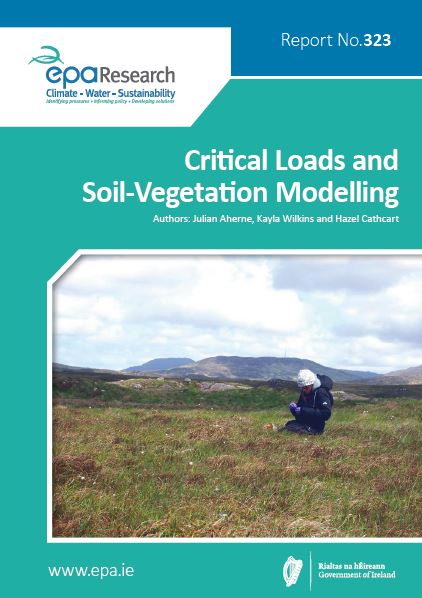
Research 323: Critical Loads and Soil-Vegetation Modelling
Authors: Julian Aherne, Kayla Wilkins and Hazel Cathcart, July 2020
Year: 2020
This report presents results from the research project “Critical Loads and Soil-Vegetation Modelling”. The principal objectives of this project were to update critical loads of acidity and eutrophication for terrestrial and aquatic ecosystems in Ireland, to evaluate the potential impacts of nitrogen deposition on plant species diversity.
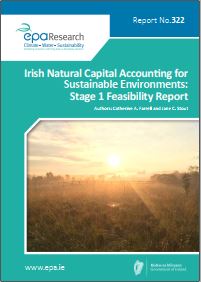
Research 322: Irish Natural Capital Accounting for Sustainable Environments: Stage 1 Feasibility Report
Authors: Catherine A. Farrell and Jane C. Stout, July 2020
Year: 2020
The INCASE (Irish Natural Capital Accounting for Sustainable Environments) research project aims to apply Natural Capital Accounting at a pilot (catchment) scale in Ireland. This Interim Report reviews natural capital accounting approaches, data requirements for the project, catchment selection, potential applications and feasibility.
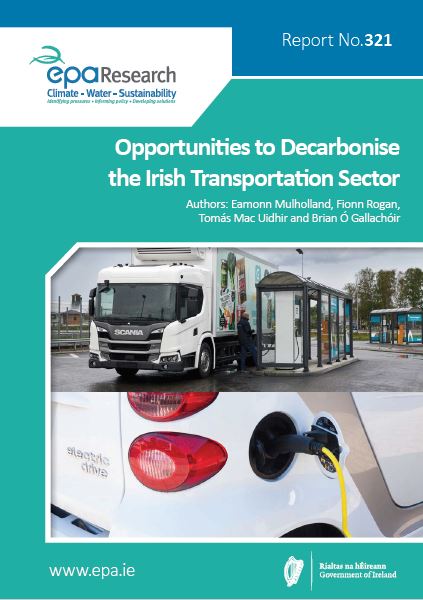
Research 321: Opportunities to Decarbonise the Irish Transport Sector
Authors: Eamonn Mulholland, Fionn Rogan, Tomás Mac Uidhir and Brian Ó Gallachóir, July 2020
Year: 2020
In 2017, the energy sector was responsible for 60% of Ireland’s greenhouse gas (GHG) emissions. The largest contributor to Ireland’s energy-related GHG emissions, at 33%, is the transport sector. A range of technoeconomic and socioeconomic analytical tools and models were developed and employed in this project to generate an evidence base that can inform decarbonisation focused transport sector decision-taking and policymaking.

Research 320: Assessing Vulnerability to Climate Change: An Approach Illustrated through Large Urban Scale Adaptation (Urb-ADAPT)
Authors: Roberta Paranunzio, Barry O’Dwyer, Paul J. Alexander, Marco Guerrini, Ned Dwyer and Jeremy Gault, July 2020
Year: 2020
Globally, climate change will have wide-ranging effects on all aspects of society, the environment and the economy. This is particularly the case for urban areas, which represent only a small fraction of the Earth’s surface (less than 3%) but are where more than half of the global population resides and concentrations of assets and economic activities are found.
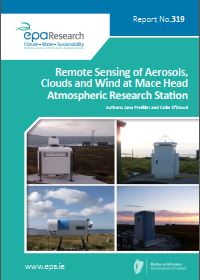
Research 319: Remote Sensing of Aerosols, Clouds and Wind at Mace Head Atmospheric Research Station
Authors: Jana Preißler and Colin O’Dowd, July 2020
Year: 2020
The power of remote sensing lies in its ability to automatically and continuously characterise parts of the atmosphere that can be far away from the sensor, e.g. at high altitudes from the ground in the case of this study. This fellowship focused on continuous high-resolution (vertical and temporal) profiling of the atmosphere over Mace Head Atmospheric Research Station using active and passive ground-based remote sensing techniques.

Research 318: Source Apportionment of Particulate Matter in Urban and Rural Residential Areas of Ireland (SAPPHIRE)
In this research project, the contribution of residential solid fuel burning to ambient levels of wintertime PM2.5 was determined in the towns of Killarney, Enniscorthy and Birr. The results show that the burning of peat, coal and wood for home heating is by far the largest source of PM2.5 air pollution in these locations., June 2020
Year: 2020
In this research project, the contribution of residential solid fuel burning to ambient levels of wintertime PM2.5 was determined in the towns of Killarney, Enniscorthy and Birr. The results show that the burning of peat, coal and wood for home heating is by far the largest source of PM2.5 air pollution in these locations.

Climate Research Coordination Group: Second Report on Activities: January - December 2019
Authors: This report has been prepared by the EPA on behalf of the Climate Research Coordination Group, May 2020, June 2020
Year: 2020
This second report presents a summary of the Climate Research Coordination Group’s activities in 2019.
The Potential for Economic Reprocessing of Mine Waste in Ireland
Authors: Paul Gordon, Shane Lavery, June 2020
Year: 2020
This small scale study looked at the potential for economic reprocessing of mine waste in Ireland.
Silvermines Wetland Substrate Reprocessing
Authors: Jamie Robinson, Paul Gordon, Shane Lavery, June 2020
Year: 2020
The purpose of the study was to establish, in principle, if the metals held in the substrate could be extracted as a resource.
Draft EPA Research 2030 Framework
Year: 2020
The EPA is opening a Public consultation to receive comments on the draft EPA Research 2030 Framework.
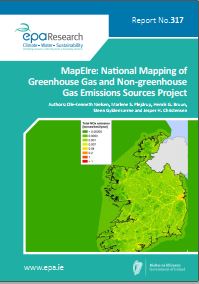
Research 317: MapEIre: National Mapping of Greenhouse Gas and Non-greenhouse Gas Emissions Sources Project.
Authors: Ole-Kenneth Nielsen, Marlene S. Plejdrup, Henrik G. Bruun, Steen Gyldenkærne and Jesper H. Christensen, May 2020
Year: 2020
This research developed a state-of-the-art integrated model system to map emissions for Ireland’s emission inventories of air pollutants and greenhouse gases. Based on a variety of spatial and statistical data, the MapEIre model produced detailed spatial emissions at a resolution of 1 km × 1 km.
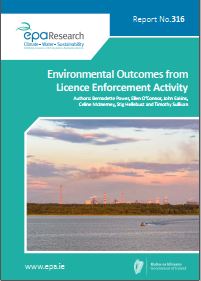
Research 316: Environmental Outcomes from Licence Enforcement Activity
Authors: Bernadette Power, Ellen O’ Connor, John Eakins, Celine McInerney, Stig Hellebust and Timothy Sullivan, May 2020
Year: 2020
The ultimate objective of environmental regulation is the prevention and reduction of environmental harm from pollution, habitat loss and resource depletion. The findings from this research provide an update of current practices and recent changes introduced in some jurisdictions.

Research 315: Activity Data for Emissions of Non-methane Volatile Organic Compounds
Authors: Stephen Barry and Bernadette O’Regan, April 2020
Year: 2020
Non-methane volatile organic compound (NMVOC) emissions from Solvent and Other Product Use have been estimated for 2006–2012. This included updating the activity data, emission factors and emissions data and compiling this information into a national emissions estimate for the specified years.

Research 314: Deepening Public Engagement on Climate Change: Lessons from the Citizens’ Assembly
Authors: Laura Devaney, Diarmuid Torney, Pat Brereton and Martha Coleman, April 2020
Year: 2020
The Irish Citizens’ Assembly afforded 99 citizens the time, space and structure to deliberate on some of the most important issues facing Irish society and politics. The 13 climate recommendations agreed on by the citizens in consideration of “How the State can make Ireland a leader in tackling climate change” were significantly more radical than many expected. They encompassed a suite of sectors, solutions and policy actions.
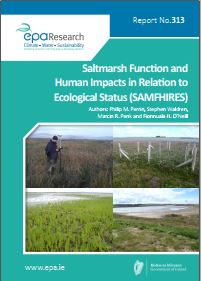
Research 313: Saltmarsh Function and Human Impacts in Relation to Ecological Status (SAMFHIRES)
Authors: Philip M. Perrin, Stephen Waldren, Marcin R. Penk and Fionnuala H. O’Neill , April 2020
Year: 2020
Coastal saltmarshes provide a range of important ecosystem services but face increasing challenges because of human activities. Ecological assessments of saltmarshes are required to inform reporting in compliance with the European Union (EU) Habitats Directive (HD) (92/43/EEC) and Water Framework Directive (WFD) (2000/60/EC).
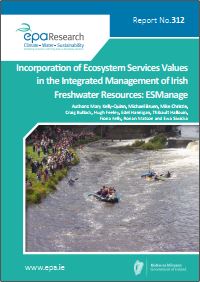
Research 312: Incorporation of Ecosystem Services Values in the Integrated Management of Irish Freshwater Resources: ESManage
Authors: Mary Kelly-Quinn, Michael Bruen, Mike Christie, Craig Bullock, Hugh Feeley, Edel Hannigan, Thibault Hallouin, Fiona Kelly, Ronan Matson and Ewa Siwicka, April 2020
Year: 2020
The ESManage project tested an eight-step methodological framework to help embed ecosystem services and the ecosystem services approach into policy and decision-making for the sustainable management of water resources, as required by the Water Framework Directive (WFD).
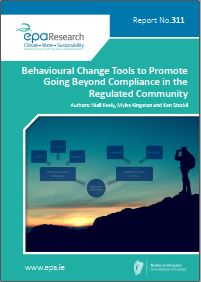
Research 311: Behavioural Change Tools to Promote Going Beyond Compliance in the Regulated Community
Authors: Niall Keely, Myles Kingston and Ken Stockil, April 2020
Year: 2020
The environmental compliance and enforcement landscape has evolved significantly over the last number of decades, with policy and legislation serving as a key driver. The nuances and complexities of compliance and enforcement have also evolved, as they now require a better understanding of the barriers and challenges, drivers and incentives, and the behavioural and contextual factors at play among regulated communities.
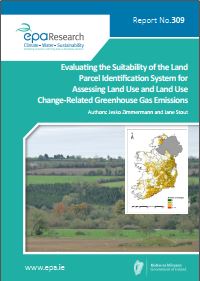
Research 309: Evaluating the Suitability of the Land Parcel Identification System for Assessing Land Use and Land Use Change-Related Greenhouse Gas Emissions
Authors: Jesko Zimmermann and Jane Stout, March 2020
Year: 2020
Land use and land use change have a significant impact on national greenhouse gas (GHG) emissions and are therefore an integral part of national GHG reporting, as laid out by the United Nations Framework Convention on Climate Change. In Ireland, land use and land use change reporting is currently based on total national agricultural area data provided by the Central Statistics Office.
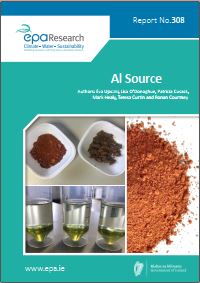
Research 308: Al Source
Authors: Éva Ujaczki, Lisa O’Donoghue, Patricia Cusack, Mark Healy, Teresa Curtin and Ronan Courtney, March 2020
Year: 2020
The scope of the Al Source project is to determine the optimisation of state-of-the-art technologies that could offer potential in the reuse of bauxite residue to recover valuable elements.
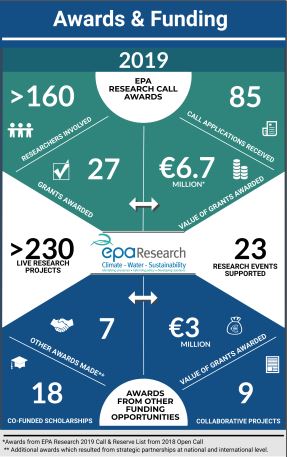
EPA Research Infographic: 2019 in Numbers
Year: 2020
This infographic gives information about the EPA research programme in 2019